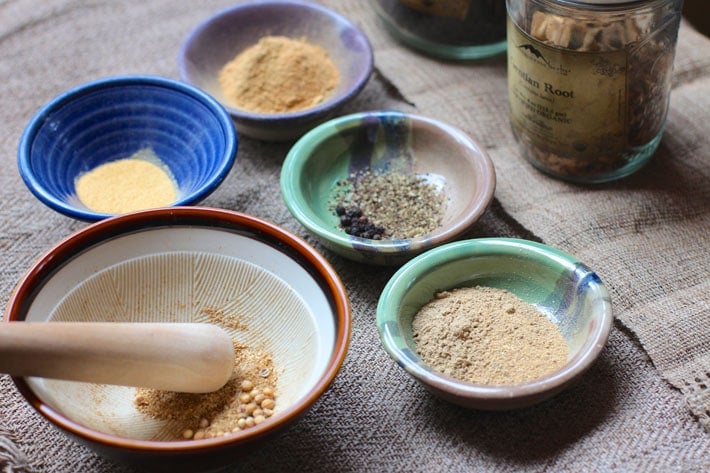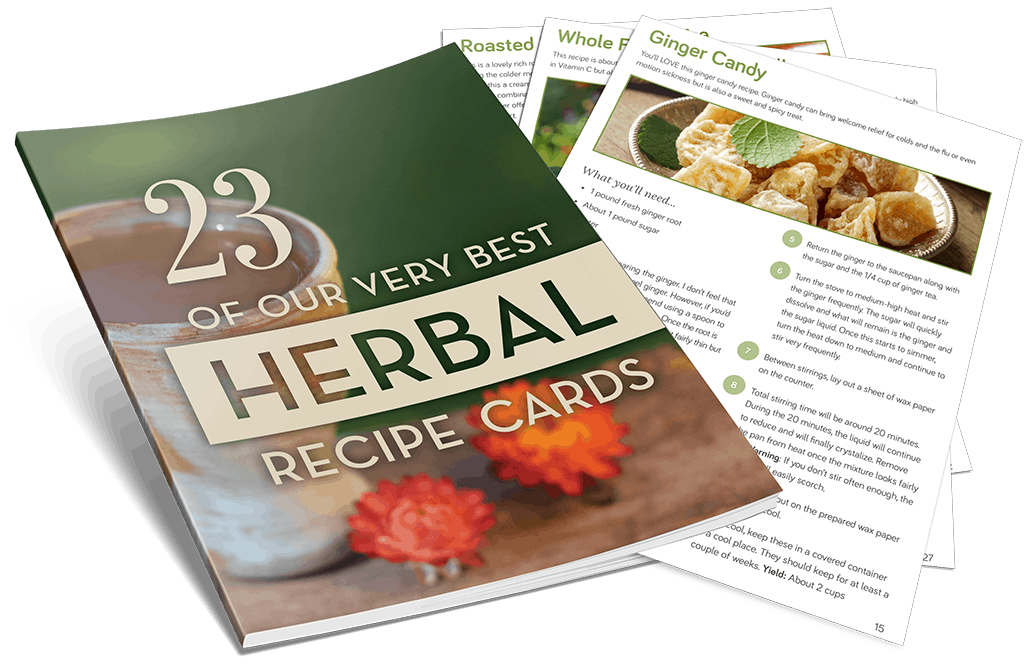Do you have bitter deficiency syndrome?
While the bitter taste is often the most disliked one it is one of the most important tastes for promoting healthy digestion. Because people often don’t love the taste it gets taken out of their life, to the detriment of their digestion!
Herbalist James Green may have been the first to coin the term “bitter deficiency syndrome” to describe the many common digestive complaints that are caused by a lack of bitters in a person’s diet.
The herbal world is currently going through a bitter resurgence and they are all the rage right now.
Why are bitters so important?
It’s easy to think of the bitter taste as simply a sensation on our tongue, but bitter taste receptors are found throughout our entire digestive tract. More than a simple taste sensation, the bitter taste influences many different parts of digestion.
Here are just a few ways that bitters support healthy digestion.
- The bitter taste on our tongue stimulates the secretion of saliva, which aids carbohydrate consumption.
- Further down the digestive tract, bitters increase HCL secretion, an important stomach enzyme that breaks down proteins and helps extract nutrients from foods. A lack of HCL has been attributed to heart burn, stomach ulcers, nutrient deficiencies and food intolerances.
- The bitter taste has a strong influence on liver and gallbladder functions. It causes bile formation in the liver as well as bile secretion by the gallbladder. Bile is crucial for the digestion of fats and oils.
- The bitter taste also helps to regulate blood sugar levels and promotes the release of pancreatic digestive enzymes.
- Lastly, the bitter taste also helps to promote regular bowel movements by supporting healthy peristaltic movement of the colon.
This is a simple overview highlighting only some of the important influences the bitter taste has on our digestion.
Many common digestive complaints such as gas, bloating, constipation, overeating, lack of appetite, nausea, difficulty digesting fats, food intolerances (due to lack of digestive enzymes) could all potentially be explained by bitter deficiency.
That’s why herbalists are so passionate about solving this bitter deficiency syndrome!
How to get bitters into your life
Along with this recent bitter revolution there has been a surge in bitter herbal alcohol extracts. These are a convenient way to add bitters to your life and are used by adding 5-30 drops of the extract into a bit of water, which is then drunk before meals.
However, you don’t have to use alcohol to get the benefits of bitters. You can simply incorporate bitter foods into your meals (dandelion greens, radicchio and Brussels sprouts are some of my favorites). Or you can use bitter herbal tea blends. While these options work as well as the bitters alcohol extracts, they aren’t always as convenient.
This is a convenient bitters formula that doesn’t use alcohol.
Before we get to the bitters recipe, let’s take a look at the herbs in this formula.
Yellow Gentian (Gentiana lutea)
This beautiful plant is a classic cooling bitter herb that has been used in France and Italy for hundreds of years. Like many bitters it has been used for high fevers, getting rid of parasites and for promoting digestion. Yellow gentian has been over-harvested from its native habitat in the Alps so be sure to only buy cultivated sources.
Angelica (Angelica archangelica)
Angelica is a common ingredient in bitter blends since it is both bitter and aromatic, both of which are important for digestion. Angelica has a long history of use for a variety of ailments and it is commonly used for supporting healthy digestion.
Coriander (Coriandrum sativum)
Coriander is the seed of the cilantro plants. It is widely used as a corrigent to bitter herbs to help improve their flavor. It’s also used as a carminative to relieve minor digestive complaints such as gas and bloating.
Black Pepper (Piper nigrum)
Black pepper is the most heavily traded herb of our time. It’s easy to dismiss this common spice as a standard condiment but black pepper has many impressive qualities. It’s a warming spice that builds our digestive fires and it increases the bio-availability of nutrients in our foods and herbal formulas. By adding black pepper to your meals regularly your body is able to extract more nutrients from the food you eat.
Fennel (Foeniculum vulgare)
Fennel is commonly used to relieve stagnant digestion such as gas and bloating. It has a pleasant taste and is often included in formulas for babies with colic.
Orange Peel (Citrus sinensis)
While orange peels are frequently thrown in the garbage or compost here in the States, they are an important herb in Chinese Medicine. Orange peels are used to decrease phlegm and promote digestion.
Salt
Often wrongly vilified, salt is an important part of our diet and can promote good digestion. Salt stimulates appetite and provides nutrients necessary for the formation of digestive excretions.
So how do these herbs work together?
While the gentian root and angelica are our bitter herbal support, the carminative and warming herbs such as the coriander, black pepper and fennel further support our digestion as well as improve the taste!
Bitter Digestive Pastilles
This bitters recipe uses powdered herbs along with honey to form pastilles (a fancy French term for pills). While the bitter taste is highlighted in this recipe, the aromatic herbs and spices and honey modulate the bitter taste to make it more of a tasty treat.
Even if you think you can’t stand the bitter taste, give this a try! You can also start with lower amounts of gentian and angelica and slowly increase the amounts over time as your taste buds adapt to the bitter taste.
For best results use freshly powdered herbs and use these bitter pastilles within 3 months of making them.
What you’ll need…
- 1/2 teaspoon angelica root powder
- 1/4 teaspoon gentian root powder
- 1/4 teaspoon coriander powder
- 1/4 teaspoon orange peel powder
- 1/8 teaspoon black pepper (freshly ground)
- about 1 teaspoon honey (find some local raw honey and avoid commercial honey)
Coating
- 1 teaspoon fennel seed powder
- 1/8 teaspoon fine sea salt
- Combine the powdered herbs (not the fennel or salt) in a small bowl. Mix well.
- Gently heat up the honey in a small saucepan or double boiler. We don’t want to cook the honey, just heat it up enough that it has a thinner, syrupy consistency that will make it easier to mix with the herbs.
- Little by little pour the honey into the powdered herbal mixture. I like to pour in a bit. Stir. Then pour a bit more if needed.
- You’ll know you have enough honey added when the mixture can be molded together without breaking apart.
- Roll the dough into pea sized balls.
- These digestive “pills” can then be rolled into the fennel powder and salt. Store these in an airtight container. Enjoy one 15 minutes before your meal.
These will last for quite a while but the fresher they are, the more potent the herbs will be.
This makes a fairly small batch (about 10 pea sized balls). Try it and then suit the recipe to your own tastes. If you are new to bitters you may want to add a bit less gentian root. If you really like pungent spices perhaps add a bit more coriander.
Creating your own bitter recipes is half the fun.
Make your own bitter digestive pastilles with this Bitters Recipe.
















